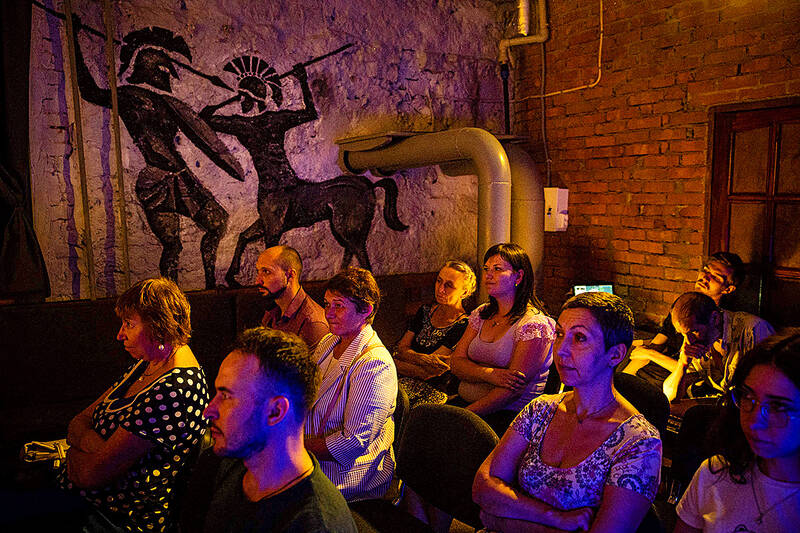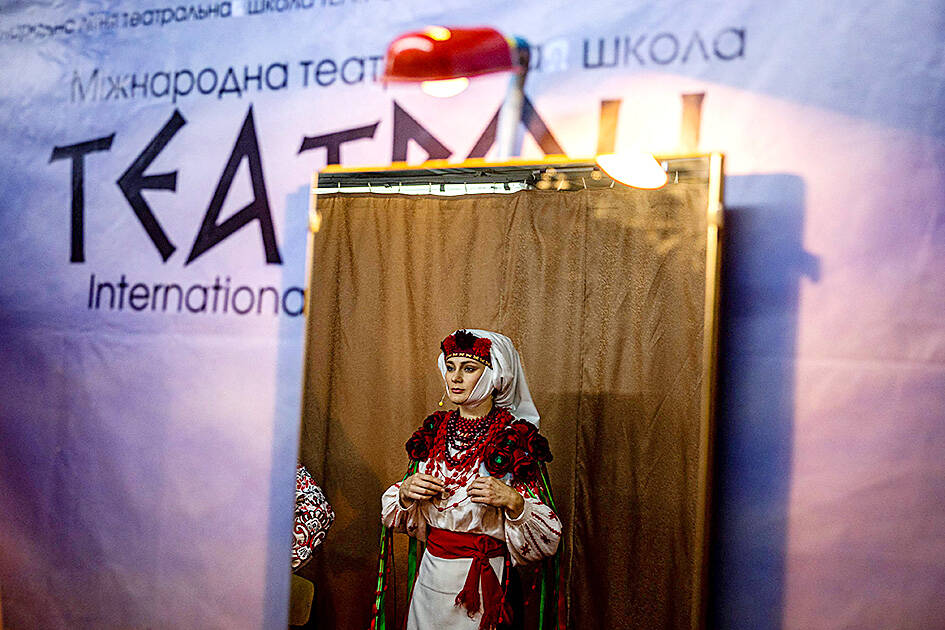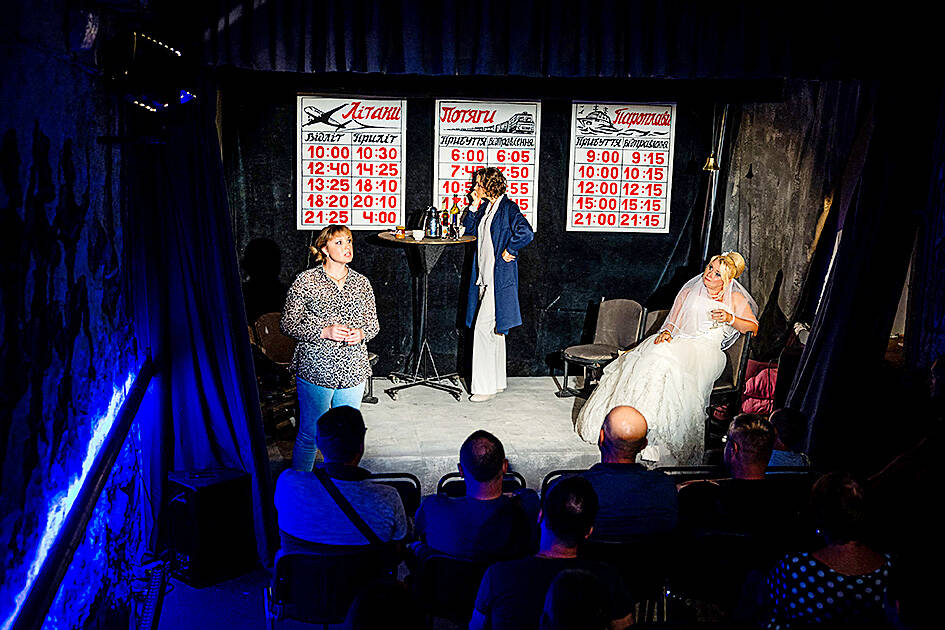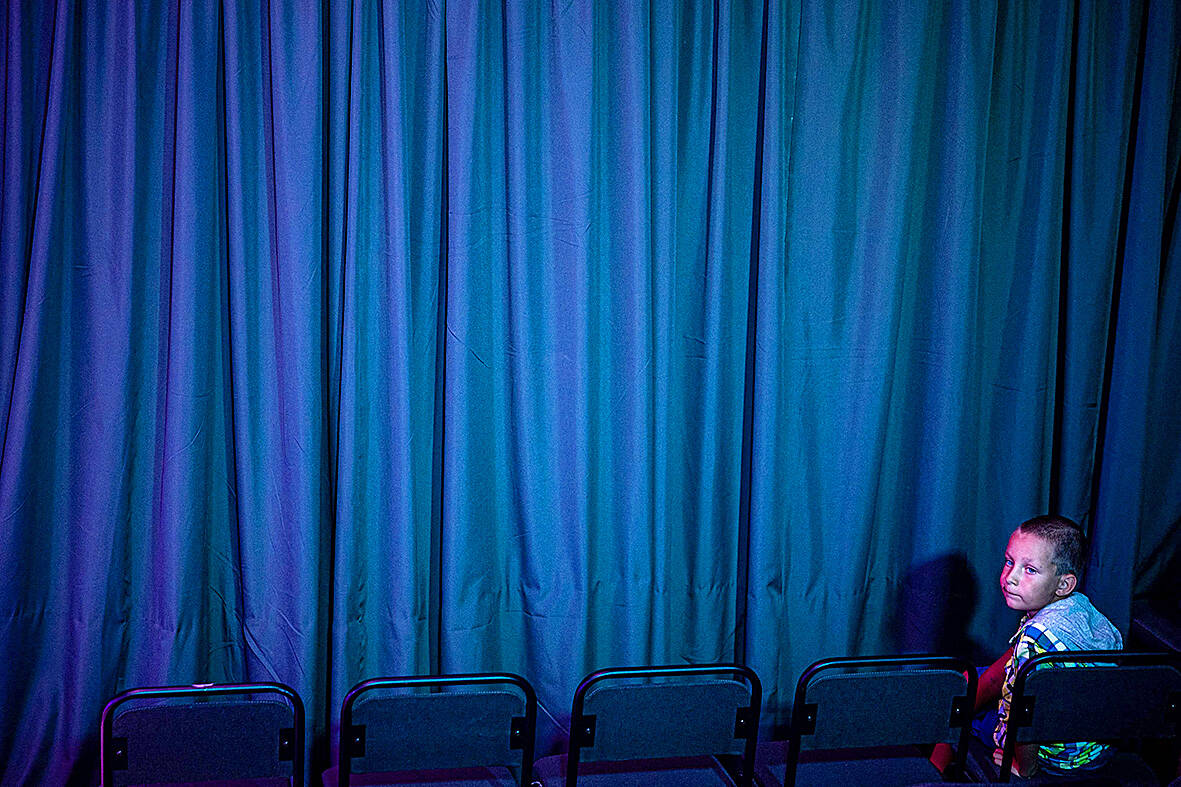It’s an opening night like no other at Mykolaiv’s theater, with the audience ushered down into an underground shelter this week for the first performance since war broke out.
“We need this place to fight on the cultural front too,” artistic director Artiom Svytsoun says.
The tiny underground stage and the minimalist set provides “a form of ‘art therapy’” for the people who have stayed in Mykolaiv and need something other than the grinding fear of war.

Photo: AFP
Welcoming audience members, giving tours of the subterranean theater and taking care of the myriad technical details, 41-year-old Svytsoun is the beating heart of the operation. He is the one who worked to get the theater reopened in the relative safety of an underground bunker.
With the help of a European aid fund, his team took two months to transform a shelter four meters below ground into the 35-seat venue, its irregular white walls covered with a fresco reminiscent of classical theaters.
The strategic port city of Mykolaiv had a population of half a million souls before Russia invaded on Feb. 24.

Photo: AFP
Now it bears the scars of the many bombardments it has endured almost daily for the past six months. Three hundred meters from the elegant neo-classical building that houses the theater stands the twisted concrete shell of the regional administration, which was hit by a missile on March 29 that killed 37 people.
NAME CHANGE
According to the local town hall, the city has enjoyed just 25 attack-free days since Feb. 24. President Volodymyr Zelensky has said that, along with Kharkiv in the north and the eastern Donbas region, Mykolaiv is the most heavily bombed city in Ukraine, despite the fact that the front line is about 20km away.

Photo: AFP
The destruction has not been limited to military targets. Three universities were recently bombed and, according to regional authorities, 123 cultural institutions have been destroyed in the region since the fighting began.
Another effect of the invasion on the Mykolaiv theatre has been a name change.
The former Mykolaiv Russian Drama Theatre is now the Mykolaiv Theatre of Dramatic Arts.

Photo: AFP
In the tiny dressing room, its walls covered with photos of Soviet, Ukrainian and Hollywood actors, Kateryna Chernolishenko, 43, receives the final touches to her stage make-up and is in a good mood.
“I’m very happy to be back on our stage, back home, and I think it’s important that art can be a support for people,” says the actress, who like her fellow thespians volunteered to take part in this premiere.
Her colleague Marina Vassyleva, who is about to don a wedding dress, adds emphatically: “Actors, in these circumstances, are the doctors of the human soul.”

Photo: AFP
“I see my mission and the meaning of my life right now. I am needed here in Mykolaiv,” she says.
MAKING LIVES EASIER
Since the start of the war, three of the theater’s actors have joined the army and another 20 percent of the troupe have taken refuge elsewhere in Ukraine, or abroad — a modest proportion in a town that has lost more than half its population, according to the town hall.
The company is used to playing in a 450-seater theater.
Now the plays are being adapted and squeezed into the “stage in the shelter,” as it is called. But despite the war, it is not just about performing patriotic works. After a curtain-raiser paying tribute to Ukraine, the first play of the new season, by a contemporary national author, is an absurdist play about “the realization of our desires”, says Svytsoun.
The bunker theater will put on two shows a day, from Thursday to Sunday, much to the delight of theatergoer Olga Kroutchok. “I hope to come back every weekend. Theater brings emotions to people in these times of war, and it makes our lives easier,” said the 55-year-old.
Fellow audience member Oleksander Skotnikov, 42, agrees. “When we are under the bombs, as we are now, the theater gives us a big smile and inspires people to keep on living.”

That US assistance was a model for Taiwan’s spectacular development success was early recognized by policymakers and analysts. In a report to the US Congress for the fiscal year 1962, former President John F. Kennedy noted Taiwan’s “rapid economic growth,” was “producing a substantial net gain in living.” Kennedy had a stake in Taiwan’s achievements and the US’ official development assistance (ODA) in general: In September 1961, his entreaty to make the 1960s a “decade of development,” and an accompanying proposal for dedicated legislation to this end, had been formalized by congressional passage of the Foreign Assistance Act. Two

Despite the intense sunshine, we were hardly breaking a sweat as we cruised along the flat, dedicated bike lane, well protected from the heat by a canopy of trees. The electric assist on the bikes likely made a difference, too. Far removed from the bustle and noise of the Taichung traffic, we admired the serene rural scenery, making our way over rivers, alongside rice paddies and through pear orchards. Our route for the day covered two bike paths that connect in Fengyuan District (豐原) and are best done together. The Hou-Feng Bike Path (后豐鐵馬道) runs southward from Houli District (后里) while the

March 31 to April 6 On May 13, 1950, National Taiwan University Hospital otolaryngologist Su You-peng (蘇友鵬) was summoned to the director’s office. He thought someone had complained about him practicing the violin at night, but when he entered the room, he knew something was terribly wrong. He saw several burly men who appeared to be government secret agents, and three other resident doctors: internist Hsu Chiang (許強), dermatologist Hu Pao-chen (胡寶珍) and ophthalmologist Hu Hsin-lin (胡鑫麟). They were handcuffed, herded onto two jeeps and taken to the Secrecy Bureau (保密局) for questioning. Su was still in his doctor’s robes at

Mirror mirror on the wall, what’s the fairest Disney live-action remake of them all? Wait, mirror. Hold on a second. Maybe choosing from the likes of Alice in Wonderland (2010), Mulan (2020) and The Lion King (2019) isn’t such a good idea. Mirror, on second thought, what’s on Netflix? Even the most devoted fans would have to acknowledge that these have not been the most illustrious illustrations of Disney magic. At their best (Pete’s Dragon? Cinderella?) they breathe life into old classics that could use a little updating. At their worst, well, blue Will Smith. Given the rapacious rate of remakes in modern